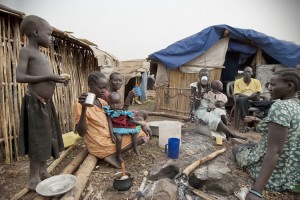South Sudan in Crisis
February 21, 2017
Yesterday, February 20, the United Nations (UN) declared a famine in parts of South Sudan, a nation in eastern Africa. Famine is a prolonged food shortage that causes widespread hunger and death. The UN’s World Food Programme (WFP) said that war and a collapsing economy have left 100,000 people facing starvation in South Sudan, and a further 1 million people are on the brink of famine. The WFP called for urgent and immediate humanitarian aid to slow or reverse “an escalating catastrophe.” Nearly 5 million people—more than 40 percent of South Sudan’s population—are in need of agriculture, food, and nutrition assistance.

Displaced people prepare food provided by humanitarian aid in a temporary camp near Juba, the capital of South Sudan. Credit: © Vlad Karavaev, Shutterstock
South Sudan broke away from the rest of Sudan to form the Republic of South Sudan in 2011. In late 2013, however, disagreements between ethnic groups led to civil war in the new nation. Fighting killed thousands of people until the warring sides signed a peace agreement in August 2015. Sporadic fighting resumed in July 2016, however, forcing many people from their homes and disrupting the nation’s agriculture, economy, and transportation. Crops have been ruined or left unharvested, and livestock populations have declined rapidly. Many people cannot afford the nation’s ever-rising food prices, and others are unable to reach camps that have food, water, and medical supplies.
Relief operations have been underway across South Sudan since early 2014. Aid programs have stemmed the severity of the food crisis in some areas, but they could not prevent famine in the nation’s northern Unity state, scene of the worst of the fighting. Famine struck the same area during an earlier civil conflict in 1998.
Throughout history, famine has struck at least one area of the world every few years. The famine in South Sudan is the first to be declared since 2011 when some 250,000 people died of hunger in nearby Somalia. Famine is again threatening areas of Somalia this year, and parts of Nigeria and Yemen are also currently at risk. The UN declares a famine when at least 20 percent of households face extreme food shortages, 30 percent of people are suffering from acute malnutrition, and the daily death rate from hunger exceeds 2 in every 10,000 people.


